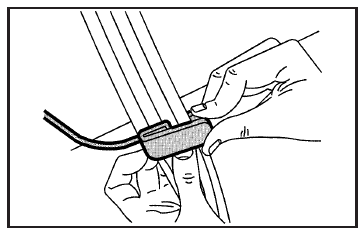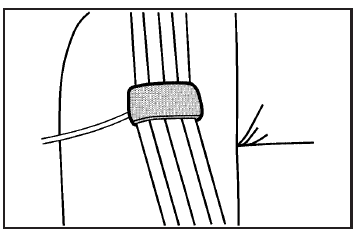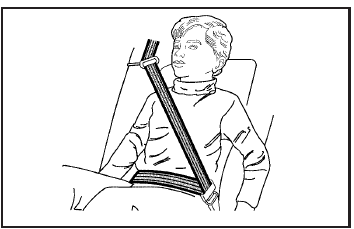Rear Safety Belt Comfort Guides
Rear shoulder belt comfort guides may provide added safety belt comfort for older children who have outgrown booster seats and for some adults. When installed on a shoulder belt, the comfort guide positions the belt away from the neck and head.
There is one guide for each outside passenger position in the rear seat. Here is how to install the comfort guide to the shoulder belt:
1. Slide the guide off of its storage clip located between the interior body and the seatback.

2. Slide the guide under and past the belt.
The elastic cord must be under the belt.
Then, place the guide over the belt and insert the two edges of the belt into the slots of the guide.

3. Be sure that the belt is not twisted and it lies flat. The elastic cord must be under the belt and the guide on top.
CAUTION:
A safety belt that is not properly worn may
not provide the protection needed in a
crash. The person wearing the belt could
be seriously injured. The shoulder belt
should go over the shoulder and across
the chest. These parts of the body are best
able to take belt restraining forces.

4. Buckle, position, and release the safety belt as described in Rear Seat Passengers on page 33. Make sure that the shoulder belt crosses the shoulder.
To remove and store the comfort guide, squeeze the belt edges together so that you can take them out of the guide. Slide the guide back onto its storage clip located between the interior body and the seatback.
See also:
Tire Pressure Monitor System
The Tire Pressure Monitor System (TPMS) uses
radio and sensor technology to check tire pressure
levels. TPMS sensors are mounted on each tire
and wheel assembly, except the spare tire.
The TPMS ...
Fuel Additives
To provide cleaner air, all gasolines in the United States are now required to
contain additives that help prevent engine and fuel system deposits from forming,
allowing the emission control syste ...
Delayed Locking
This feature delays the locking of the doors and
the liftgate when using the power lock or the
remote keyless entry system.
The first press of the power door lock switch or
lock button on the re ...


